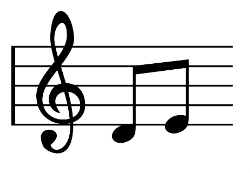There’s a Song for Everything. Should You Use Its Lyrics in Your Book?
Biff Barnes
Music provides the sound track for our lives. Nancy often says, “There’s a song for everything,” and quotes a lyric. It’s no wonder that writers seeking to create a mood or capture a moment in time should be tempted to do the same thing.
But when you are tempted to quote a song lyric in your book, think twice.
“Because songs and poems are so short,” says Jane Friedman, editor of the Virginia Quarterly Review and Scratch Magazine in a post on her blog Reading, Writing and Publishing in the Digital Age, titled When Do You Need to Secure Permissions?, “it’s dangerous to use even 1 line without asking for permission, even if you think the use could be considered fair. However, it’s fine to use song titles, poem titles, artist names, band names, movie titles, etc.”
So let’s look at the rules governing the use of song lyrics in books.
First, you are free to use songs which are in the public domain without seeking permission. The Stanford University Libraries explain the rules in an article titled Public Domain.
What falls into the public domain?
- Any work published in the US before 1923
- Any work published in the US before 1964 for which the copyright was not reviewed
- Any work published before March 1, 1989 without a copyright notice
- Works designated by their rights owners for public use without copyright protection
The Supreme Court has ruled that there is no legal requirement that attribution is required for public domain works.
“However, just because there is no legal requirement to give credit to the creators of public domain works, doesn’t mean you don’t have to do it. When copying works from the public domain, be careful to avoid plagiarism.”
There are still areas where you can run into difficulty so be sure to read the section on Public Domain Trouble Spots.

However, as the Book Baby Blog points out, “…music and lyrics written after 1923 are NOT in the public domain. The songwriters, those songwriters’ estates, and a publishing company or three may all control shares in the piece’s copyright.”
The writers and publishers of the lyrics you want to quote are entitled by law to:
- deny you the right to quote the lyrics.
- grant you permission and set the terms for usage.
- ask you to pay them any fee they want for those usages.
- ignore all your requests until you throw your hands up in the air and decide to just invent some song lyrics of your own to fit the scene.
Obtaining the rights to use a song lyric is a cumbersome process at best and can be expensive as well. In a recent Galley Cat Interview Christopher Kenneally Author and Creator Relations Director of the Copyright Clearance Center a non-profit which bills itself as the “…global rights broker for the world’s most sought-after books, journals, blogs, movies and more,” advises:
Consider not quoting the song. Lyrics, like all creative expression, are copyrighted. Copyright gives the author or creator the exclusive right to republication of the work. Any writer who wishes to quote lyrics, or for that matter, passages from another’s book, must obtain permission first. It’s probably worth asking how necessary or vital such quotation is to any particular creative work.
For any permission request, the first step is to identify the copyright holder. This is not as easy as it sounds. Look for the copyright symbol on the CD sleeve and the name of the publisher. However, in an increasingly digital world where downloads are more common, this sort of “metadata” is not always immediately available.
If you contact the publisher, don’t expect a fast reply. He or she will usually need to contact several different rights holders who may be on tour or (as it happens in rock) have recently climbed the stairway to heaven. Do expect that for all but the most obscure artist, the reuse fees may be significant.
So, although the lyric in a song may fit perfectly into your book, you may want to find another way to capture an idea, emotion, moment, or mood.
